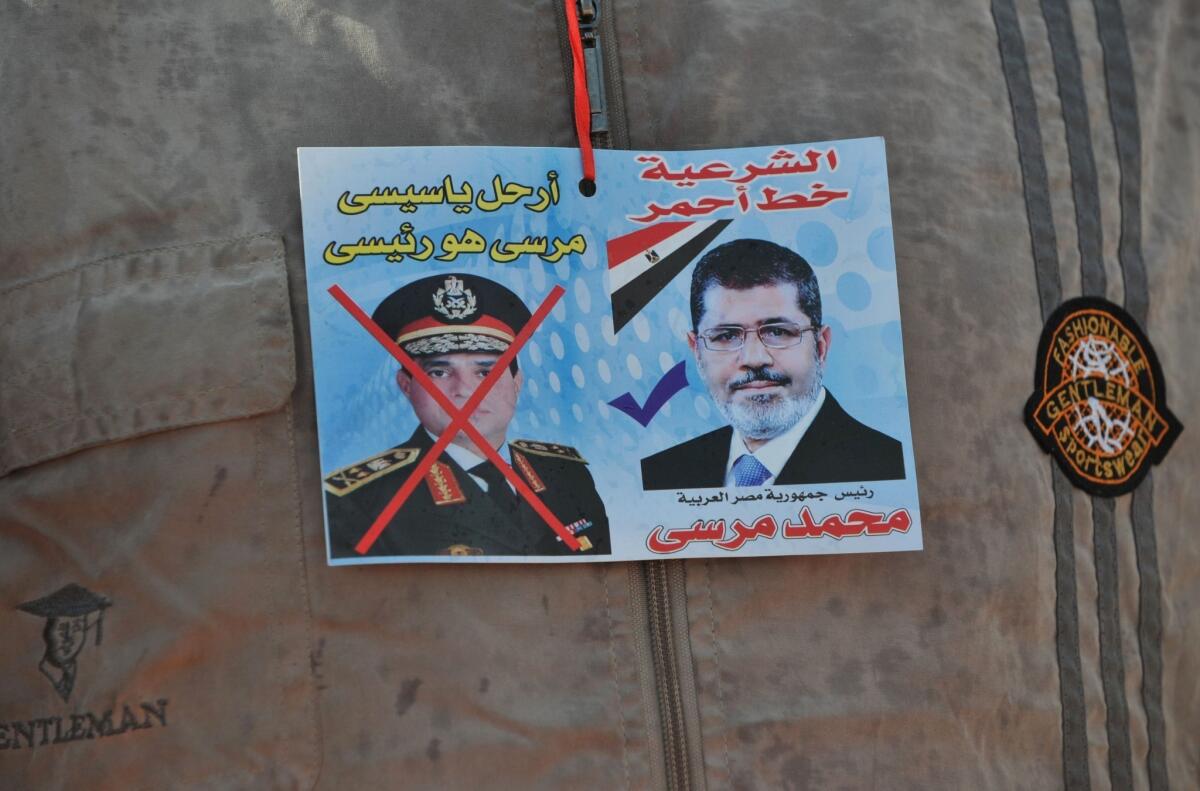U.S. delays sale of warplanes to Egypt in wake of Morsi’s ouster

- Share via
WASHINGTON — The Obama administration said Wednesday it was delaying a sale of four F-16 fighter jets to Egypt, the first sign the U.S. is rethinking its decision not to withhold military aid after the July 3 coup that ousted the Egyptians’ first democratically elected president.
The decision was made by President Obama and his top national security advisors after they concluded that allowing the sale to go forward would signal that Washington was maintaining a business-as-usual relationship with Cairo despite the removal of President Mohamed Morsi and growing unrest in Egyptian cities.
“Given the current situation in Egypt, we do not believe it is appropriate to move forward at this time with the delivery of F-16s,” Pentagon spokesman George Little said.
But he cautioned that the administration had made no decision on whether to suspend $1.3 billion in annual military aid to Egypt and was proceeding with a joint military exercise later this year — signs that the administration is nervous about losing even its limited influence over the country’s military leaders.
Obama pointedly did not call for Morsi to be returned to power and did not openly condemn the Egyptian military for suspending the constitution and ending, at least for now, the fledgling democracy that emerged after Egyptians overthrew Morsi’s predecessor, longtime U.S. ally Hosni Mubarak, in 2011.
A U.S. official said Obama had decided to hold up the delivery because he was not ready to send a highly visible message of support for the military’s action in overthrowing the Morsi government.
“The F-16s are a big-ticket item — a high-profile item,” the official said. Delivery would have been “a step too far for us, ” too much of a seeming endorsement that the United States was conducting business as usual.
The U.S. wanted to make clear that the coup was “not a U.S. backed effort — this is not a U.S. endorsement,” the official said.
U.S. officials have been trying to step carefully in Egypt, avoiding further alienating either side in a way that could even set off violence.
The White House has so far refused to describe Morsi’s ouster as a coup, which would trigger a cutoff of military assistance under U.S. law. The White House and the State Department are still conducting a review of whether Morsi’s ouster was a coup, Little said.
“I would caution against premature conclusions with respect to that [review] process of determining whether or not there was a coup,” he added. “This was a decision made about the F-16s and doesn’t necessarily reflect what the outcome will be in that process.”
In Cairo on Wednesday, the head of the armed forces, Gen. Abdel Fattah Sisi, called for mass rallies of support to give the military a “mandate” to quell violence at recent demonstrations against Morsi’s ouster.
U.S. Defense Secretary Chuck Hagel called Sisi on Wednesday to inform him of the decision to delay delivery the planes, Little said.
[For the record, 1:05 p.m. on July 24: An early version of this post incorrectly stated that the Obama administration said Monday that it was delaying the aircraft sale. The administration statement came Wednesday.]
ALSO:
India school poisonings: Principal arrested on murder charge
Royal baby’s name: His Royal Highness Prince George of Cambridge
Edward Snowden turned back at Moscow passport control, official says
More to Read
Sign up for Essential California
The most important California stories and recommendations in your inbox every morning.
You may occasionally receive promotional content from the Los Angeles Times.












